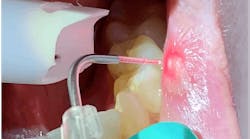You’re a successful business owner who has worked hard to achieve success, and like most entrepreneurs, you have a huge list of tasks and urgent priorities to deal with every day. Staff and employees pop in frequently, asking questions. Fires flare up most mornings, and you go to bed thinking about the laundry list of unfinished business you thought you’d have time for.
You know retirement planning is important, but it’s just hard to find the time to focus on it. An even harder task is to find someone you trust who can handle it. Unfortunately, time passes, and it passes quickly. Before you know it, your kids are in high school, filling out college applications and getting married.
Working on personal finance is important, but it’s not as urgent as your patients, your overhead or the never-ending list of business-owner tasks. That’s why people procrastinate retirement planning for so long. It feels like a second job, and it’s just not high enough in the priority scale every day.
These 10 mistakes cause many dentists to stumble on their journey to retirement –– if you can avoid these mistakes, you’ll also avoid a delayed retirement.
Let's dive in.
1. Spending too much of your income
Personal spending habits are a lot like exercise habits; they're built slowly over time and very tough to change. Using a free or inexpensive money management tool (e.g. Mint.com or our free software) can help you understand exactly where your money is going, so you don’t have to spend time using tedious budgeting techniques. As you earn more, you’ll spend more. If you don’t track what you spend, it will inflate quickly. Before you know it, you’ll be spending twice as much as you used to.
Here’s the simple trick: dentists who track their spending will automatically reduce their spending over time. When you glance at your smartphone and it says you spent $$$$ this month, you will automatically start making positive adjustments. One more thing -- the actual money you spend each month isn’t as important as the percentage of your income that it represents. For example, do you spend 25% of your income, or 50% of you income? The percentage is what really matters.
Calvin Coolidge, 30th President of the United States, said it best: "There is no dignity quite so impressive, and no one independence quite so important, as living within your means.”
2. Improper debt reduction
I love seeing dentists avoid consumer debt, but imbalanced debt reduction has spoiled the golden years for more than a few dentists. Eliminating personal debt, including your primary residence, is a reasonable goal, but completely eliminating all practice debts too quickly may come at the expense of your retirement, leaving you with little to no savings. This is especially true for dentists and other professionals whose businesses are constantly in need of new equipment and regular face lifts to their facilities.
Paying down debt the right way is an exercise of patience, and requires consistent analysis that considers your personal tax rate, interest rates, age, prepayment penalties and retirement goals. Get out of debtby the time you retire, but don’t let debt reduction stop you from investing your money until too late in your career.
“What can be added to the happiness of a man who is in health, out of debt, and has a clear conscience?” - Adam Smith (1723-1790), father of modern economics and authorof The Wealth of Nations
3. No automated savings or investment program
What if I told you there was a system that would slowly, but surely, put you on a path toward becoming a millionaire? What if such a system could be set up in an afternoon? What if this system was statistically proven to have an extremely high probability of success, required no painful budget, and could be done from within the comfort of your home?
Look at your income from last year, and start by saving 10%. Take 10% of your annual income, and divide it by 12. Set up an investment account online (or with a trusted advisor) and begin a monthly contribution into your investment account. Do it every month, don’t EVER stop until after you retire, and don't use the money for ANYTHING except retirement! Automate the withdrawal so it deducts the money from your business checking account (the place you have the largest balance of cash, so it’s not too hard to keep going).
In my experience, this practice has created more millionaires than any other wealth accumulation tactic.
4. Too many insurance premiums
If you’re like me, you have friends, family or colleagues who call you regularly to sell you stuff. Dentists and other high-income professionals are some of the most common targets for big insurance policies. I regularly meet people who are paying too much money for too much insurance. I'm particularly uncomfortable about using whole / variable / permanent life insurance as a way to accumulate for retirement.
I don’t advocate being underinsured. I value the insurance I have for the incomparable protection and security it provides to me and my family. However, if you don’t actively reduce insurance costs over time, you will spend unnecessary money on unnecessary protection. Good salesmen are persistent, and insurance salesmen are no exception. Consequently, most dentists are making insurance purchasing decisions without really analyzing their needs for various types of protection.
As you save more money and your personal wealth increases, you can afford to reduce various types of insurance.
5. Unnecessarily high practice overhead
Remember your first hire at the office? Remember how much you paid that person? I bet you can. Entrepreneurs usually remember the first time they made the commitment to carry someone else’s payroll. It’s a big stress, and often something they don’t forget. Do you remember the first time you gave someone a meaningful raise or a bonus check?
As time passes and collections increase, so does your overhead. It increases slowly, almost imperceptibly, and before you know it you’re carrying tens of thousands of dollars, even hundreds of thousands of dollars, of payroll within a short period of time. You used to remember the small increases to payroll, marketing, supplies and technology expenses, but now it’s all just pouring out of your business checking account, and you’re focused on growing collections.
Take a look at payroll expenses, supply costs, lab bills, marketing expenses, leases and all of the little stuff. Divide each expense by your gross collections (deposits, sales, revenue), and keep track of the percentage that each overhead item accounts for in your practice. Over time, notice where things change, and how categories may oscillate. Upon doing this, even just once, you'll ask yourself why you went so long without picking through your bank statement or your QuickBooks to cut back on expenses that have crept in over time.
If you don’t actively cut your overhead, it will overtake you and your ability to retire successfully. You’ll have to make some hard decisions, but these tough decisions will protect your income, your family and your chances at achieving financial security.
6. Large losses in speculative investments
Few things implode your retirement like bad investments. It takes years to accumulate significant amounts of money, and only minutes to see it disappear. Dentists are among the many professionals who make mistakes with their investments, costing them years and years of their retirement.
While some dentists may have the knowledge to self-direct their investments, the majority of dentists do NOT, and the cost of hiring a competent professional just isn’t as expensive as it used to be. As a general rule, DON'T make investments without consulting an independent advisor. Pay this person for their time, and get an independent perspective on any investment you are about to make. Making investments on your own may result in becoming emotionally or overly attached to one particular deal or person who appears to be a superior investor.
Far too often, I see dentists become slaves to their careers because as soon as they build any meaningful amount of liquidity (cash, liquid investments), they make a decision to invest in things that have significant risks. Such decisions are often made without asking for any guidance.
Many dentists make direct investments into companies or large real estate projects managed by friends and family (private placements). I strongly discourage this practice for most people, and for some, I discourage this indefinitely. Most dentists should simply build meaningful amounts of cash (3 - 6 months worth of monthly overhead) and then begin a personal emergency fund of at least 6 months worth of income using conservative mutual funds. After this, most dentists should strive to accumulate 20 - 30 years of liquid investments using a broad, globally-diversified portfolio of publicly traded investments (various stock and bond mutual funds). While these investments do not always provide the highest possible return, they do provide a significant degree of liquidity (in case you run into trouble), and they lower your risk. Don't forget, you've already taken a lot of risk to get to this point (dental school, business ownership) and you've carried a lot of debt. Don't put everything at risk, especially when you're likely to retire early by simply avoiding any major mistakes.
For most dentists, losing $100,000 in a bad investment is the equivalent of adding many years of extra work to your career.Don’t take unnecessary risks, and be very cautious about any investment you make.
7. Embezzlement
This one is obvious, but it plagues too many people, including dentists and specialists. This is one of the primary reasons I recommend employing a third-party accounting firm to help provide oversight and management of your bookkeeping, banking processes and tax preparation.
A serious case of embezzlement is difficult, or even impossible, to recover from. I’ve seen doctors lose nearly a decade of income to embezzlement! You just can’t afford to make this mistake! Proper employee screening, good internal cash management and bookkeeping processes, and solid third-party oversight will eliminate most problems, thus keeping you out of the hurt tank.
8. No written goals or written retirement plan
Establishing concrete financial goals is critical to a successful retirement.
• I want to have the option to stop working at age 62.
• I want to have my new home paid off in full by age 60.
• I want to have a retirement income of $100,000.
• I want to leave at least $25,000 passed on to each of my children.
If you don’t have concrete goals, you won’t accomplish near as much. For example, if you didn’t set a date for the Dental Admissions Test, would you have been able to pass? If you didn’t set a salary for your first hire, would you have been able to attract them?
Good financial planning is about setting specific financial goals. Don’t worry, they don’t have to be perfect. Goals can be simple starting points, but you have to have them, or you’ll waffle around for years in what I call “ Subjectiville.” People who live there talk like this:
“We’ll see Hank, gonna have to see how things go”.
"Depends..."
“I dunno. Lots could change."
“Can’t predict the future, ya know?"
9. No accountability to an expert.
Best-selling author Malcolm Gladwell writes about the “10,000 Hour Rule.” He claims that the key to success in any field is, to a large extent, a matter of practicing a specific task for a total of around 10,000 hours.
Financial advisors went to school to study finance. So, to be an excellent dentist, hire an excellent financial advisor. Too many people think that they can moonlight multiple careers, save money and get ahead by saving “fees” they would have otherwise paid. True, there are certain times in life when you just gotta mow your own lawn and some people are best served by a little DIY. However, you’re an extremely busy entrepreneur who would lose north of $500 an hour by spending time on anything else but clinical procedures. I can promise you that you can hire most anything you need at less than $500 an hour!
Don’t do your own accounting & taxes. Don’t compile your own legal documents. And don’t invest without an advisor.
Let's maximize the opportunity you’ve already created through your hard work and specialization. Hiring a financial advisor and staying focused on your practice will make you more money, provide accountability and protect you from things you don’t understand well enough to moonlight.
10. Unclear accounting
Many dentists spend valuable time entering data into QuickBooks and trying to get “caught up” on their financials. For some people, this may not be a bad course of action, but I recommend against spending any time doing the accounting for your business on your own.
Outsource the data entry to someone who can help you prepare accurate financials for your practice on a monthly basis. You spend time learning how to analyze the financials and make meaningful adjustments to your practice.
In my experience, it’s unlikely to find many dentists make adjustments to their payroll, marketing, and overhead based on a clear understanding of their financials. Furthermore, they barely have enough time to do the data entry, leaving them no time to analyze the information. To make good decisions, you need good information. Dentists need accurate financials on a monthly basis, and they’re not likely to get this done on their own.








